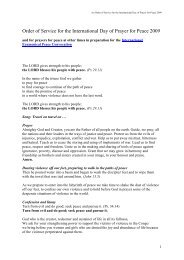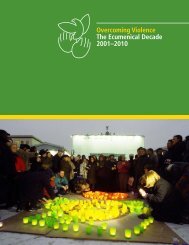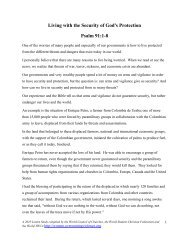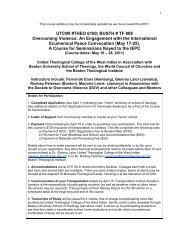Alternative Globalization Addressing Peoples and Earth
Alternative Globalization Addressing Peoples and Earth
Alternative Globalization Addressing Peoples and Earth
You also want an ePaper? Increase the reach of your titles
YUMPU automatically turns print PDFs into web optimized ePapers that Google loves.
28<br />
financial markets. They look after themselves in times of financial crisis<br />
too. Funding can usually be found domestically or through the international<br />
institutions to bail out their investors when their speculation turns sour.<br />
When low- <strong>and</strong> middle-income countries require concessional liquidity,<br />
they face dwindling levels of support <strong>and</strong> crippling conditionalities. Often<br />
they are forced to turn to private banks for credit at market rates, diverting<br />
resources needed for health <strong>and</strong> education to boost the dividends of the<br />
banks’ shareholders.<br />
4.2 Ecological <strong>and</strong> illegitimate debts<br />
The period of neo-liberal finance <strong>and</strong> enforced structural adjustment has<br />
added to the pre-existing social <strong>and</strong> ecological debts that the North owes<br />
to the South. Acción Ecológica, an Ecuadorian civil society organization,<br />
defines ecological debt as:<br />
“… the debt accumulated by Northern, industrial countries toward<br />
Third-World countries on account of resource plundering,<br />
environmental damages <strong>and</strong> the free occupation of environmental space<br />
to deposit wastes, such as greenhouse gases, from the industrial<br />
countries.” 13<br />
13<br />
The concept of environmental space, or the “ecological footprint”, starts from the<br />
assumption that every earth citizen has equal rights to the earth’s resources. The 20 percent<br />
of the world’s population who live in the richest countries make 86 percent of all consumer<br />
purchases; they consume 58 percent of all energy <strong>and</strong> account for 53 percent of all current<br />
carbon emissions (<strong>and</strong> for 80% historically). Collectively this richest fifth owes an enormous<br />
ecological debt to the majority of the world’s population, who endure some of the worst<br />
environmental devastation <strong>and</strong> are often denied their fair share of the wealth produced.











